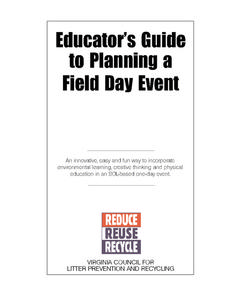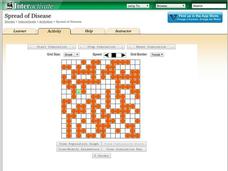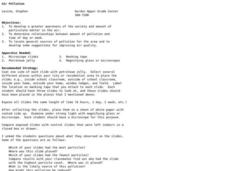Virginia Department of Education
Educator’s Guide to Planning a Field Day Event
Plan an environmentally friendly field day for your young conservationists with this collection of activities and resources. Whether it's bowling with plastic bags full of crumpled up newspaper and empty plastic...
Curated OER
Space Day Activities
Celebrate Space Day on May 7th with aerospace lessons that are sure to get kids excited about science and engineering!
Chicago Botanic Garden
Calculating Your Carbon Footprint
Unplugging from technology for one day per week will decrease your carbon footprint—are you up to the challenge? Part two in a series of three allows individuals to explore their personal carbon footprints. By first taking a quiz at home...
Shodor Education Foundation
Spread of Disease
Control the spread of a contagious disease. An applet allows pupils to run a simulation on the spread of a disease. Rules govern how the disease is spread and the length of time it takes to recover. Learners view the spread visually and...
Curated OER
Classroom Content
Students examine the roles that scientists and government agencies play in protecting citizens from commercially produced chemicals. They watch a video, conduct Internet research, and prepare a media presentation.
Curated OER
Doctors as Detectives
Learners consider the investigative and detective work that goes into disease control. They research specific diseases and simulate a doctor-patient diagnosis situation.
Curated OER
Weather Lessons: Explore the Possibilities
Looking to the sky isn't just for day dreamers.The weather is a fascinating way to explore science and history.
Curated OER
Biodiversity and Ecosystems
Middle schoolers differentiate between biotic and abiotic factors in this science lesson. Learners collect data for the experiment and analyze the data after graphing it using the CBL 2. This experiment is split into two different...
Indian Land Tenure Foundation
Respect for Land
Youngsters examine how people show respect and care for the land. Specifically, learners see how the Native Americans truly did care for and respect the land, and still do so to this day! They also explore how they themselves can care...
Curated OER
Photosynthesis: A Controlled Experiment
Students investigate the amount of starch in a plant under 3 different conditions. In this photosynthesis lesson plan, students compare the amount of starch in a plant with increased carbon dioxide conditions, a plant with decreased...
Curated OER
How Do Plants and Animals Change the Environment Around Them?
If you have elodea and snails in your classroom aquarium, or if you have access to a pond with these organisms, your young biologists can set up a controlled experiment to determine how certain ecosystems respond in light and dark...
Curated OER
Green Leaves
Third graders, after having conducted one experiment three times, record their observations results in a chart. They predict what hidden colors they believe that a leaf holds. Students record their predictions in their science note books...
Curated OER
Air Pollution
Learners collect and examine particulate matter found in the air. In this pollution lesson, students use microscope slides and petroleum jelly to collect particulate matter from several different locations, then use a microscope to...
Curated OER
Effects of Bread Sanitary Conditions on Mold Growth
Learners examine fungi and where it comes from. In this mold lesson students determine the percentage of fruit juice in a fruit then identify the different types of mold.
Curated OER
Air Quality and Transportation
Second graders study about air pollution and the effects it has on our Earth. Students tally cars on a sheet that has been categorized as follows: One person in car, two persons in car, or three or more persons in car. Students go to...
Curated OER
Fast Food Survey Using Bar Graphs
Second graders create a bar graph to pictorically represent the data collected from a survey of students. They use Excel to electronically create the graphs and data tallies. They then interpret their data using sentences to explain.
Curated OER
Reading the Waves
Students view video segments which reveal the parts of sound and what factors control sound. The viewing and post-viewing activities serve to reinforce the video segments using worksheets and hands-out experiments.
Curated OER
It's a Small World After All! (Pond Microcosms)
Students use microscopes to investigate the diversity of life that exists in pond water. They then conduct a controlled investigation to study the effect of a pollutant (rice) on a microcosm ecosystem.
Curated OER
Petri-fied of Bacteria
Students examine the existence of bacteria all around them and consider the roles, both positive and negative, that bacteria play. Over a period of several days, students conduct an experiment in which they predict, determine, log, and...
Curated OER
Your Own Greenhouse
Young scholars discuss the similarities between the Earth's atmosphere and a greenhouse. In this science lesson, students make their own greenhouses out of plastic bottles and thermometers. Young scholars record the temperature different...
Curated OER
Drinkable Snow
Students explore snow. In this forms of water lesson, students read a story about snow, identify the types of snow found in Alaska, and learn Inuit words for snow. The lesson calls for an Intuit Elder to visit the classroom as a guest...
Curated OER
Mariposas
Students examine how animals use camouflage for survival. In this investigative lesson students define vocabulary words and see how it is the environment that controls which adaptations will help in survival.
Curated OER
What Do Plants Need to Grow?
Fourth graders control variables to determine the effect on plant growth. They collect information by observing and measuring and construct simple graphs, tables, maps and charts to organize, examine and evaluate information.
Curated OER
Games and Activities to Teach Molecular Genetics
Students demonstrate a working knowledge of cell interactions such as DNA replication, protein synthesis (transcription and translation), through active participation in a cooperative group.























